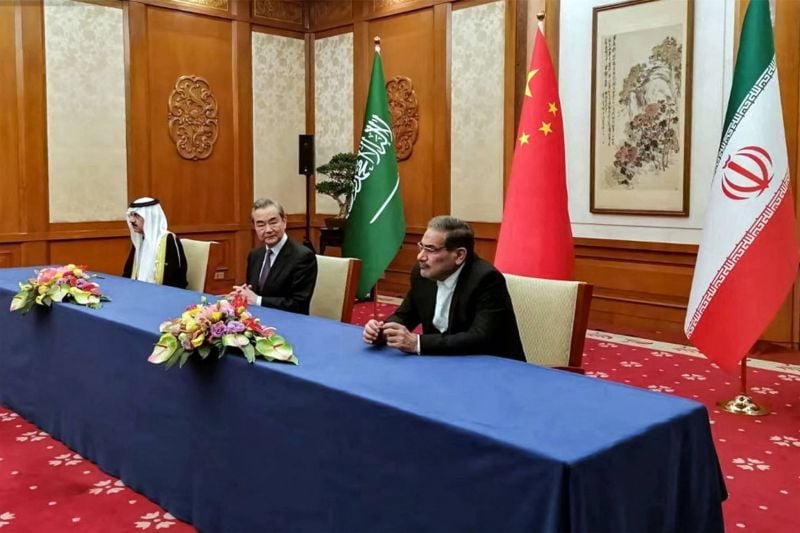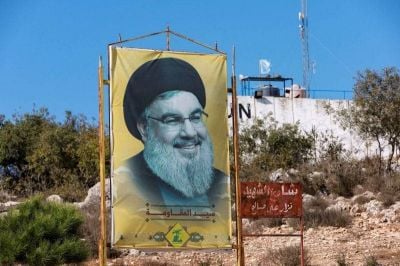
This handout image provided by Nournews agency shows the Secretary of the Supreme National Security Council of Iran Ali Shamkhani (R), the Director of the Office of the Central Foreign Affairs Commission of the Chinese Communist Party (CCP) Wang Yi (C), and Saudi Arabia's National Security adviser and Minister of State Musaad bin Mohammed al-Aiban (L) meeting together in Beijing on March 10, 2023. (Credit: AFP PHOTO / HO / NOURNEWS)
The announcement came as a surprise: Iran and Saudi Arabia are expected to re-establish diplomatic ties within the next two months. An agreement was signed under the aegis of China, thus establishing the country as a major player in the Middle East.
The Facts
- An agreement between Iran and Saudi Arabia was signed in Beijing on Friday, March 10, to restore diplomatic ties between the two countries, which previously severed ties in 2016.
- After days of negotiations in the Chinese capital, Admiral Ali Shamkhani, head of Iran's Supreme National Security Council, and Saudi national security adviser Musaid Al-Aiban signed a tripartite document with China's diplomatic chief, Wang Yi.
- The document states that, in less than two months, Tehran and Riyadh should have restored diplomatic relations and reopened their respective embassies and diplomatic missions.
- The agreement also affirms the "respect of the states’ sovereignty and the non-interference in their internal affairs," according to a statement issued by the official Saudi press agency.
- After the agreement signing, Saudi national security adviser Musaid Al-Aiban told Al-Arabiya that he "hopes to continue a constructive dialogue with Iran" based on the "principles of good neighborliness."
The context
- Since the establishment of the Islamic Republic in 1979, the two regional heavyweights have experienced periods of tension and de-escalation. Iran and Saudi Arabic respectively claim worldwide Shiite and Sunni leadership and oppose each other on many regional issues.
- Riyadh and Tehran cut ties in 2016 following the execution of Shiite Sheikh Nimr al-Nimr in Saudi Arabia, which led to attacks on the Saudi embassy in Iran.
- Since April 2021, Saudis and Iranians have conducted several rounds of bilateral talks about Yemen through Iraqi intermediation. Both countries have been fighting by proxy in Yemen since 2015; Riyadh leads a coalition in support of the government recognized by the international community, whereas Tehran supports the Houthi rebels.
- Any diplomatic breakthrough between the two countries then remains linked to security advances: Saudi Arabia is regularly targeted by missile or drone attacks from the Houthis, one of which notably caused a partial halt to national oil production in September 2019.
- Friday's deal comes as a comprehensive peace agreement on Yemen seems to have been reached in Muscat, where the Yemen government, the Houthis and Saudi Arabia discussed extending a truce that ended in October 2022, according to Gulf diplomatic sources cited by The Arab Weekly media outlet.
- On the other hand, concern over Iran's nuclear program was reignited when the International Atomic Energy Agency (IAEA) found traces of uranium enriched to nearly 84 percent at Iran's Fordo site in February. This level is close to the enrichment threshold needed to produce a nuclear weapon. Negotiations on the 2015 Vienna Agreement, which limited Iranian’s nuclear program in exchange for sanctions relief, have been stalled since summer 2022.
- Faced with these developments, Israel has intensified its shadow war against the Islamic Republic of Iran. In January, strikes in the city of Isfahan were said to have been conducted by the Israeli army, and it is believed that the country is behind several air raids that targeted Iranian or Hezbollah interests in Syria this week.
- The conclusion of the Iranian-Saudi agreement was announced the day after the New York Times revealed Saudi Arabia’s conditions to normalize its relationship with Israel: security guarantees, assistance in developing its civilian nuclear program and fewer restrictions on arms sales.
What’s at stake
- With this agreement, Beijing — which is close to Tehran and a trade partner of Riyadh — has taken on an unprecedented mediator rolein the Middle East. Presenting itself as a power that advocates non-interference and doesn’t make its aid conditional on human rights improvements, China is thus affirming its place as a lead player in the region, while the United States is apparently disengaging. However, Washington continues to assert its desire to remain present in the region, particularly to counteract Chinese advances.
- Concerning Iran and its nuclear program, Americans and Israelis are firm in their desire to prevent the country from obtaining nuclear weapons. But the Thursday visit to Israel by American Secretary of Defense Lloyd Austin underlined the differences between American and Israeli approaches: Israel warns that it prepared a military option, while Washington intends to favor diplomacy for as long as possible.
-The US position reflects the concerns of its Arab partners, who are at the front line of a potential direct confrontation with Iran. The United Arab Emirates, which normalized its relations with Israel in 2020 by signing the Abraham Accords, last year distanced itself from the option of Israeli military strikes in the Islamic Republic. With Friday's agreement, Riyadh would follow in the footsteps of the United Arab Emirates, which sent its ambassador back to Tehran last August after a six-year diplomatic break.
- The agreement could also pave the way for other political breakthroughs in the region, such as the next president in Lebanon — where Riyadh previously vetoed a pro-Hezbollah candidate — or in Syria, where the kingdom seemed to make a gesture towards reintegrating the country into to the Arab League after the Feb. 6 earthquake.
- While it appears to be a step towards de-escalation, the agreement is far from eliminating the differences between the two regional heavyweights, who have opposing visions for the development of the Middle East and strategic allies at opposite ends of the global geopolitical spectrum.
